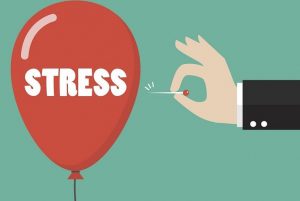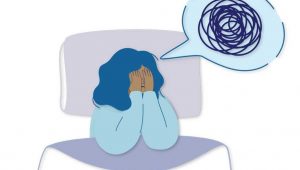What is stress, and how can it be overcome?
These days it is almost impossible to find someone who has not experienced any stress. But what is pressure, and how can we save ourselves from the stress monster?
Stress is the body’s response to pressure from a specific situation or event manifest as a physical, psychological, or emotional reaction. We all deal with stress at some point in our lives. Most of us face some stressors: sickness and self-loathing, future trials, job issues, approaching project delivery times, and financial problems. In some cases, stress may be positive and helpful. Sometimes stress can make us more aware of what is going on around us, increase our focus, and increase our productivity by forcing us to perform tasks.

What is anxiety?
Stress is the body’s reaction to harmful conditions. When you feel threatened, a chemical reaction occurs in your body that allows you to act in a way that prevents injury. The two main hormones, adrenaline and cortisol, enter the bloodstream through the adrenal glands during stress. These hormones stimulate a “fight or flight” response to external stimuli and suppress the body’s natural functions, including the gastrointestinal tract and genitals. When you react or run away or respond to stress, your heart rate increases, your breathing increases, your muscles tighten, and your blood pressure rises. In this way, the body becomes ready to take care of itself by caring and resisting or escaping from the situation.
The release of adrenaline, also known as epinephrine or the fight against hormones or escape, causes the following reactions in the body:
- increase of heart rate
- Increase the number of breaths per minute
- Simplify the use of glucose for muscles
- Shrinking blood vessels and delivering blood to the muscles
- Increased body sweating
- Prevent insulin production
These reactions are useful and necessary at the moment. But a frequent increase in adrenaline can lead to the following:
- Damage to blood vessels
- blood pressure
- Increased risk of heart attack and stroke
- Headache
- Anxiety
- insomnia
- Weight Gain
On the other hand, cortisol, as the main stress hormone, has the following functions:
- Increased blood glucose levels
- Help the brain use glucose more efficiently
- Increase access to substances that help repair tissue
- Changes in the immune system
- Weakening of the reproductive system and growth process
- Effects on parts of the brain that control fear, motivation, and mood swings
All of the above helps the body to react more effectively under severe stress. This process is a normal process that is very important for human survival. If cortisol levels remain high for a long time, it will negatively affect the health of the body. Effects such as:
- Weight Gain
- blood pressure
- Sleep problems
- Lack of energy
- Type 2 diabetes
- Osteoporosis
- Brain and memory problems
- Weakening of the immune system and vulnerability to infections
Stress has different meanings for different people. What causes stress in one person may not be too much to worry about in another. Some people can handle stress better than others. Not all stresses are bad, but small doses of stress can help you get things done and prevent you from getting hurt. For example, stress is a factor that forces you to apply pressure to the brakes to avoid colliding with the car in front. Our body is designed to withstand a little stress. But this plan is not such that it can withstand long-term and chronic stress without bad consequences.
What are the symptoms of stress?
Stress is the body’s response to pressure caused by a particular situation or event that can manifest as a physical, psychological, or emotional reaction.
Stress is everywhere and in everything and can affect the lives of all of us. Anxiety symptoms can be seen in children, managing finances, managing tasks, or coping with a challenging relationship. While having a little stress (beneficial stress) in life is good, too much pressure can make a person tired and mentally and physically ill.
The first step in managing stress is recognizing the symptoms of anxiety. Recognizing the signs of stress may be more difficult than you think. Most of us have a laid-back attitude when it comes to painting a picture about ourselves. Stress can affect all aspects of life, including emotions, behaviors, thinking ability, and physical health. No part of the body is immune to this. Because people manage stress in different ways, the symptoms of anxiety may vary from person to person. Signs and symptoms of stress can be vague and not easily recognizable. So if you experience any of the stress symptoms listed below, talk to your doctor about these symptoms. The first step in managing stress is recognizing the signs of stress.
Emotional symptoms of stress include:
Physical symptoms of focus include:
- Low energy
- Headache
- Stomach upset includes diarrhea, constipation, and nausea
- Muscle cramps, pain, and muscle strain
- Chest pain and high heart rate
- insomnia
- Colds and recurrent infections
- Loss of sexual desire or ability
- Nervousness and tremors, ringing in the corners, cold or sweaty hands and feet
- Dry mouth and difficulty swallowing
- Squeeze the jaws firmly and press the teeth firmly
Cognitive symptoms of stress include:
- Constant worry
- Competitive Thoughts
- Forgetfulness and disorder
- Inability to concentrate
- Poor judgment
- Be pessimistic or just consider the negative side of things
Behavioral symptoms of stress include:
- Change in appetite; Do not eat or overeat
- Postponing and avoiding tasks
- Increased consumption of alcohol, drugs, or cigarettes
- Intensification of nervous behaviors such as nail-biting, restlessness (such as shaking legs), and stressful and scary walking
What is the source of stress? Identify the main cause of stress and the cause of stress?

In an article on why zebras do not develop gastric ulcers, Dr. Robert Sapolsky, an endocrinologist and professor of neuroscience at Stanford University, examines the destructive effects of chronic stress and explains the main reasons:
Lack of sleep
In terms of stress, sleep deprivation not only prevents but also increases sleep-induced stress hormones. The story does not end here; High levels of stress hormones reduce sleep quality, increase the vicious cycle of stress, and reduce sleep.
A child strikes
According to Dr. Sapolsky , chronic stress and anxiety in adulthood may result from tragic childhood events, such as child abuse, unstable home environment, the death or absence of a loved one.
If the mother experiences a lot of stress during pregnancy, the baby may be affected by stress in the mother’s womb and may experience stress problems in the future.
Even if a painful emotional event has occurred in the past, the victim’s mind tends to experience and imagine it again by magnifying it. In the world of trauma victims, life is full of stressors that threaten their safety and the only way to prevent danger is to be vigilant and use coping mechanisms.
Constant worry about the possibility of accidents (which in these people is 24 hours a day, seven days a week) increases stress and extreme fatigue. Over time, the victim may experience anxiety disorders and terrible uncontrollable attacks such as shortness of breath, palpitations, and sweating.
Understand lack of control
According to Dr. Christina Meslik, one of the pioneers of burnout research, one of the main predictors of stress and burnout is lack of self-control. This is especially true in middle management jobs, which often face insufficient resource control, high labor demand, and low authority to do the job as best they can.
The effects of lack of control vary from person to person based on past experiences and perceptions. For some people, lack of control can lead to stress and anxiety. But others see it as a source of joy and excitement!
Type A personality
In the early 1960s, two cardiologists, Meyer Friedman and Ray Roseman used the term “type A” to describe highly competitive, overly successful, hostile, impatient, and aware of time pressures. Studies have shown that people with type A are more prone to chronic stress than others and are more likely to develop heart disease than people who smoke high cholesterol or smoke. Type A characters see the world as a hostile environment full of stressors that threaten their safety. They always feel that they are not good enough. So they do their best to prove themselves to the world.
Feeling low economic and social status
While studying non-human species, Sapolsky found that stress hormone levels were higher among low-ranking individuals in social groups and lowered among those with high social status. But it is more important for people to understand and feel their economic and social conditions. For example, a low-ranking employee in a large organization could enjoy a high social status as a local football team captain. Meanwhile, a senior manager in the same organization may feel inferior because he is in the top ten.
The same logic applies to the economic situation. While poverty is associated with high levels of stress, the feeling of deprivation and the touch of poverty may cause the highest levels of stress and anxiety in a person. For example, when his billionaire friends surround a billionaire, he feels poor as long as his low-income friends surround him.
Another factor that can cause stress is social support. People with low socioeconomic status have strong social support and experience less stress than people with high economic and social levels.
For these reasons, if we want to consider only one source as the main source of stress, we must say that everything depends on one’s perception. Perception is the window through which we interpret and make sense of the world around us and create images of ourselves, others, past, present, and future in our minds.
Chronic stress and anxiety are a byproduct of a negative perception of reality. The negative perception is the lens that sees the world as a dangerous place, and it is the mind that constantly imagines the worst-case scenarios. In this negative world, everything and everyone is a potential threat, and constant awareness (which causes more stress) is the only way to protect yourself from danger. Unfortunately, most people live without compulsion in this dangerous and competitive world they have created.
But there is another world that can only be seen through a pair of pure and neutral lenses. Few people in this world are free from stress and its harmful effects. By looking at the world through this lens, you will realize that there is no competition and that the world is not dangerous.
The main cause of stress and anxiety is conditioning and conditioning. We have all lived in this world once as innocent little children. Before life events, culture and media shape our current understanding of reality. We are conditioned from birth to feel inadequate, seek external approval, and live in fear. So we try to control our environment (including imaginary future events in our heads). The result of all this will be nothing but a stressful life.
People who live without stress dare to let go of their conditional perception of reality and focus only on what they can control at the moment.

Types of stress:
According to the American Psychological Association (APA), there are three main types of stress, each of which can affect our bodies in a specific way.
Acute stress: We may experience acute stress several times a day. This type of stress can occur when we face a challenge, feel threatened, or something unexpected happens. For example, situations such as talking in a meeting, arguing with your spouse, getting stuck in traffic, or being fined are some of these. Symptoms of acute stress appear quickly. But it does not last long. Some people may experience irritability, anxiety, sweating, headaches, stomach pain, or increased heart rate.
Acute episodic stress: Occurs if we experience repeated stress. This type of stress can take on a lot of responsibilities or a lot of work. People with type A or people who are constantly anxious are more prone to this type of stress. The symptoms of acute episodic stress are similar to those of acute stress, except they are more common and prominent. If left untreated, acute episodic stress can lead to serious health problems like clinical depression or heart disease.
Chronic stress: According to the APA definition, chronic stress is persistent stress that lasts long. This type of stress is the most harmful type of stress for human health. Chronic stress can be caused by poverty, abuse, poor work environment, poor marriage, family inefficiency, or drug use. The symptoms of chronic stress can be severe and debilitating. Some people may experience fatigue, changes in appetite, headaches, difficulty sleeping or concentration. If chronic stress is not treated for a long time, it can have serious consequences and lead to health problems such as insomnia, obesity, heart disease, high blood pressure, or diabetes.
Complications of stress:
The stresses that occasionally accompany our lives are normal and do not cause serious problems. But chronic and persistent stress can have serious side effects and cause or exacerbate the disease. Side effects of focus include:
- Psychological issues such as depression, anxiety, and personality disorders
- Cardiovascular diseases including high blood pressure, abnormal heart rhythms, heart attacks, and strokes
- Obesity and other eating disorders
- Menstrual problems
- Sexual dysfunction such as impotence and premature ejaculation in men and decreased libido in men and women
- Skin and hair problems such as acne, psoriasis, eczema, and permanent hair loss
- Digestive problems such as gastroesophageal reflux disease, gastritis, ulcerative colitis, and irritable bowel syndrome
Stress control and reduction:
The goal of stress management is not to get rid of it completely, because as we mentioned, stress can be healthy and necessary in some situations. To control pressure, you must first identify the causes of stress or stimuli. Then determine which of these can be avoided. Next, find ways to deal with the inevitable stressors.
Managing stress levels over time may help reduce the risk of stress.
- Follow a healthy diet.
- Get 7 to 8 hours of sleep a night.
- Exercise regularly.
- Minimize caffeine and alcohol consumption.
- Socialize to receive support and share it.
- Take time to rest, relax and take care of yourself.
- Learn meditation techniques such as deep breathing.
- Here are some simple things you can do to reduce stress:
- Listen to soothing music or music that you have fond memories of.
- Talk to yourself and remind yourself that there is no reason for anxiety.
- Be active; A 15-minute walk may work wonders.
- Write or draw; Even paper calligraphy can be effective.
- Talk to a friend.

Treatment of stress and anxiety:
By following the tips in controlling and reducing stress, you can overcome stress over time and win. If you can not control your pressure or have a lot of anxiety or depression, see a doctor right away. You can treat and manage these conditions as long as you seek help. Consultation with a psychologist is also a good option.
Chronic stress:
Allowing stress to affect you for a long time can devastating your physical, mental, and emotional health. You need to be aware of the warning signs of chronic stress to take care of yourself. The physical effects of chronic stress include:
- Headache
- Insomnia or excessive sleep
- Muscle pain or tension
- Digestive problems
- Changes in sexual desire
- High blood pressure
The psychological effects of chronic stress include:
- Feeling unable to perform tasks and duties
- The constant change of emotions
- Anxiety
- Unrest
- Lack of motivation
- Irritability
- Sadness or depression
Sometimes you may feel that the stress you are experiencing is too much for you to bear. If you think you can not control pressure yourself, it is best to seek professional help. Consult your GP to see if it can help you determine stress or anxiety disorder. General practitioners can also refer you to a mental health professional and provide you with the appropriate resources and tools. If you notice any of the following, you should see a specialist:
- Panic cases
- Constant feeling of worry
- The feeling of constant pressure
- Taking medicine or drinking to deal with stress
- Overeating
- smoking
- Depression
- Stay away from family and friends

Stress in pregnancy:
Mothers see many changes during pregnancy. During this time, the mother’s body and senses are constantly changing. Therefore, stress is one of the most common causes during pregnancy.
In the long run, high-stress levels can lead to health problems such as high blood pressure and heart disease. Stress can increase the risk of preterm birth (before 37 weeks of gestation) or low birth weight (weighing less than 2 kg and 500 g) during pregnancy. Babies born too soon or too soon are at risk for health problems.
The causes of stress in pregnancy are different for each mother. But here are some common causes of stress during pregnancy:
- We are dealing with pregnancy discomforts such as morning sickness, constipation, fatigue, or back pain.
- Hormonal changes can change the mother’s mood. Mood swings can make it harder to control stress.
- Concerns about how to care for the baby during pregnancy and after delivery.
- Working mothers may experience work-related stress and maternity leave.
- The mother may be concerned about her feelings and how these affect the baby.
Prolonged stress may affect the mother’s immune system, protecting her from infection and increasing the risk of uterine infection. This type of infection can cause premature labor. Other conditions that can cause stress during pregnancy include:
- Normal pregnancy conditions such as difficulty sleeping, body aches, and morning sickness may worsen by stress.
- Nutritional problems such as undereating and overeating due to stress can lead to weight loss or weight gain during pregnancy. It may also increase the risk of gestational diabetes and preterm birth.
- Stress can lead to high blood pressure during pregnancy. This puts the mother at risk for a chronic blood pressure condition called preeclampsia, premature birth, and low birth weight.
- Stress can affect how you react to certain situations. Some women cope with stress by smoking, drinking, or using drugs, exposing themselves and their children to serious problems.
- Many women worry that stress may lead to miscarriage and infant death before the 20th week of pregnancy. But there is no evidence that stress has caused a miscarriage.

Stress control in pregnancy:
To manage and reduce stress during pregnancy, with the permission of your doctor, you can consider the following tips and recommendations:
- Remind yourself that the discomfort of pregnancy is temporary. Ask your doctor how to deal with these discomforts.
- Eat healthy foods, get enough sleep, and exercise. Exercise can help reduce stress as well as prevent common discomforts during pregnancy.
- Reduce activities that you do not need to do. For example, ask your spouse to help you with household chores.
- Try relaxing activities such as prenatal yoga or meditation. Meditation can help you manage stress and prepare for childbirth.
- If you are employed, plan so that you do not have problems with maternity leave. Take advantage of any vacation that can be a great time to relax.
People around you can be a great help in relieving stress. Pregnant women are better off talking to their husbands and those around them about issues causing them stress. Also, try to ask for and help others more during pregnancy.
Result:
In our daily lives, it is almost impossible to escape stress. What we need to learn is to be able to control ourselves well in stressful situations. Meditation, exercise, and listening to music are the simplest and best stress management techniques that, along with proper nutrition, can save us from stress. Do not neglect the help of psychologists and counselors to deal with stress. Try to control pressure by recognizing the symptoms of anxiety before changing chronically.


